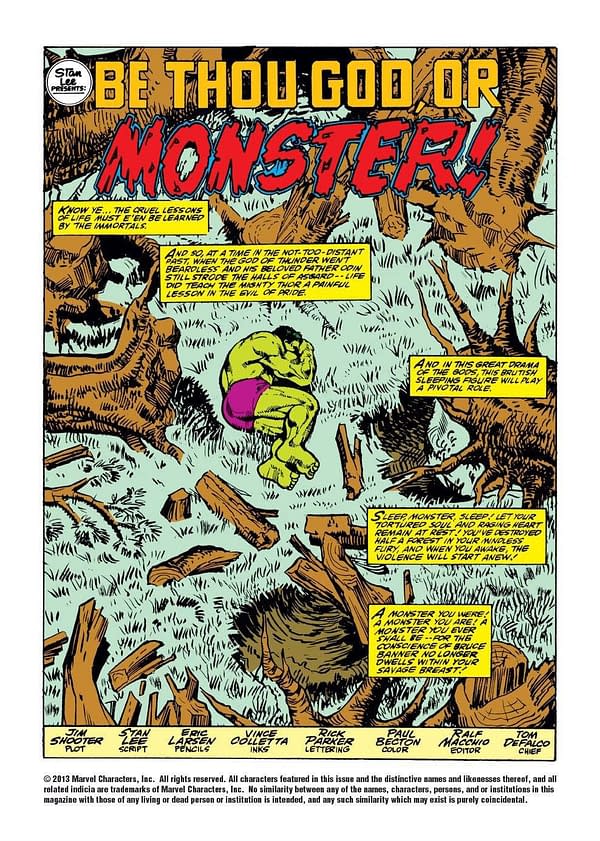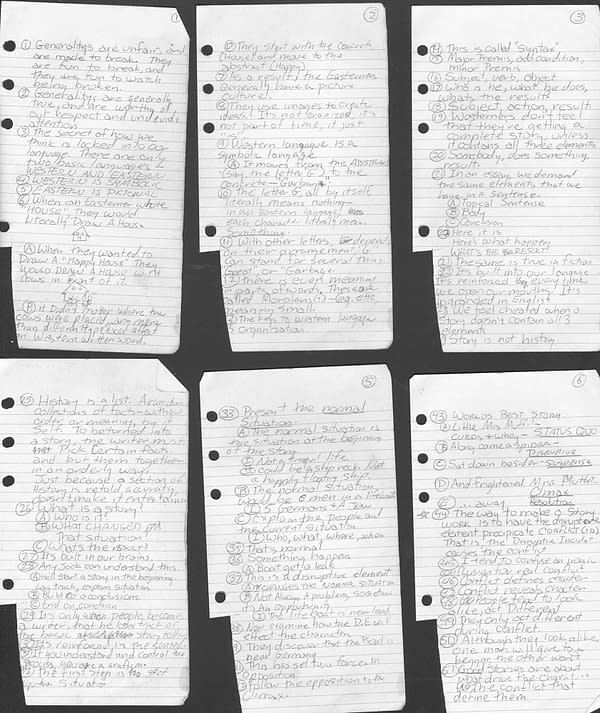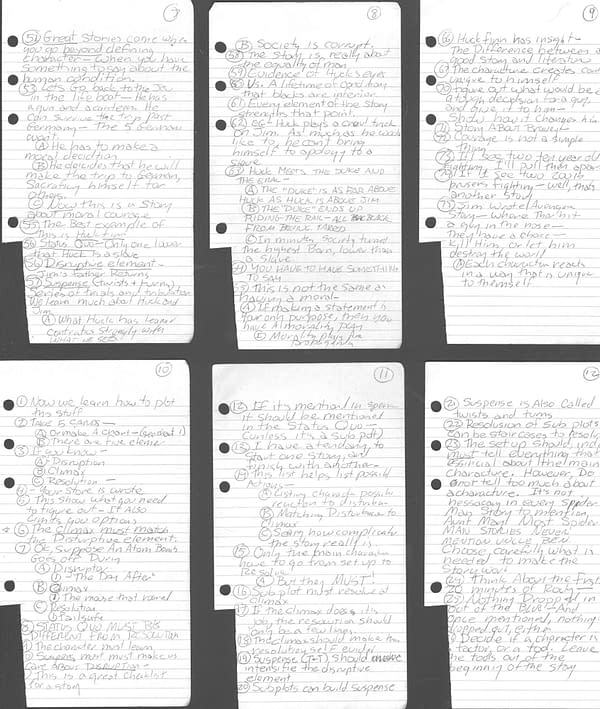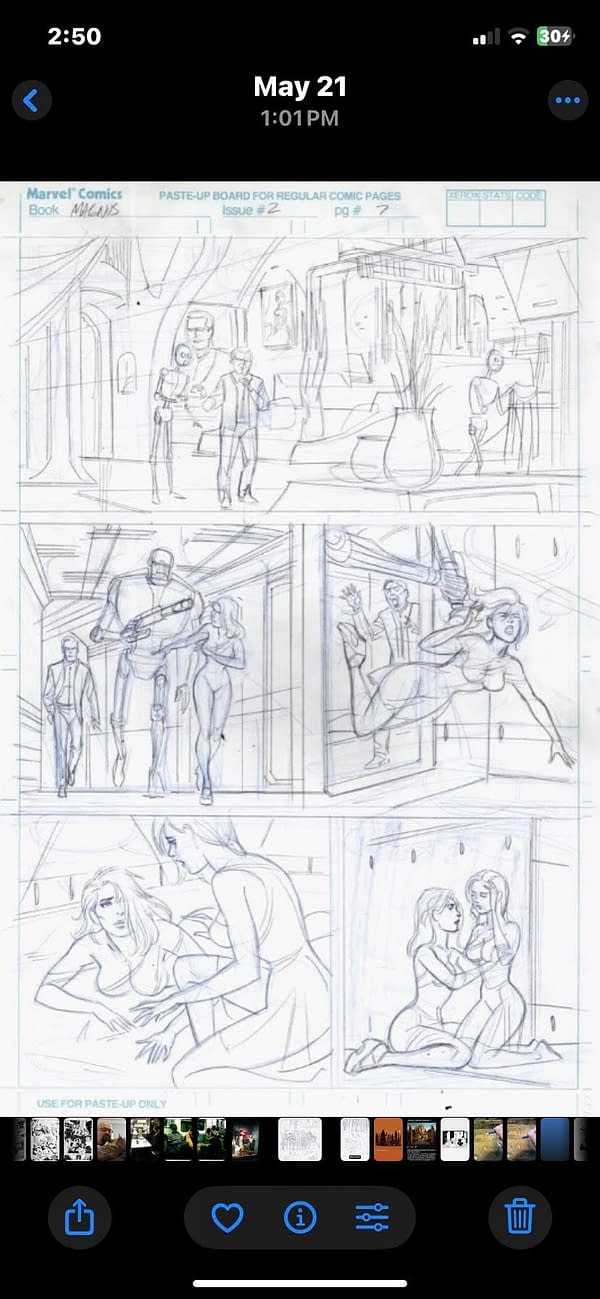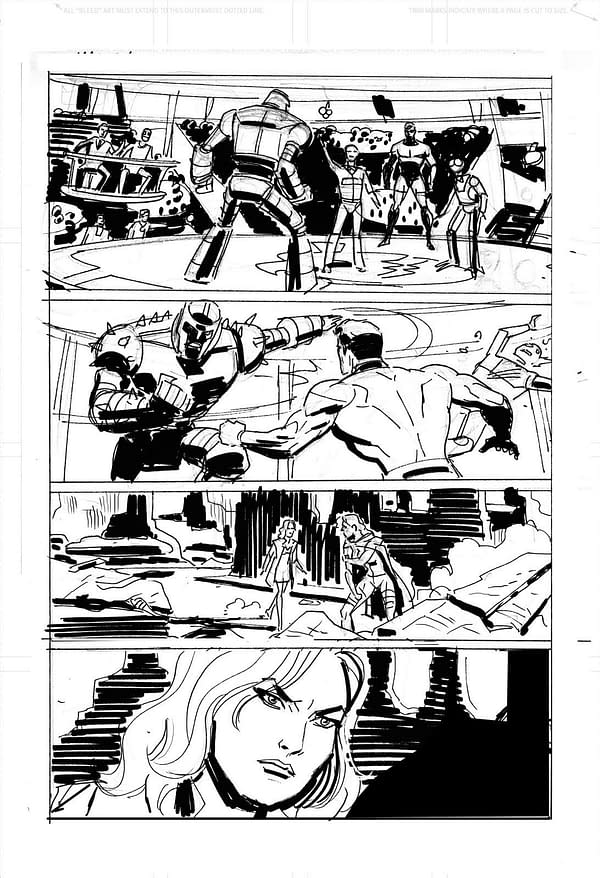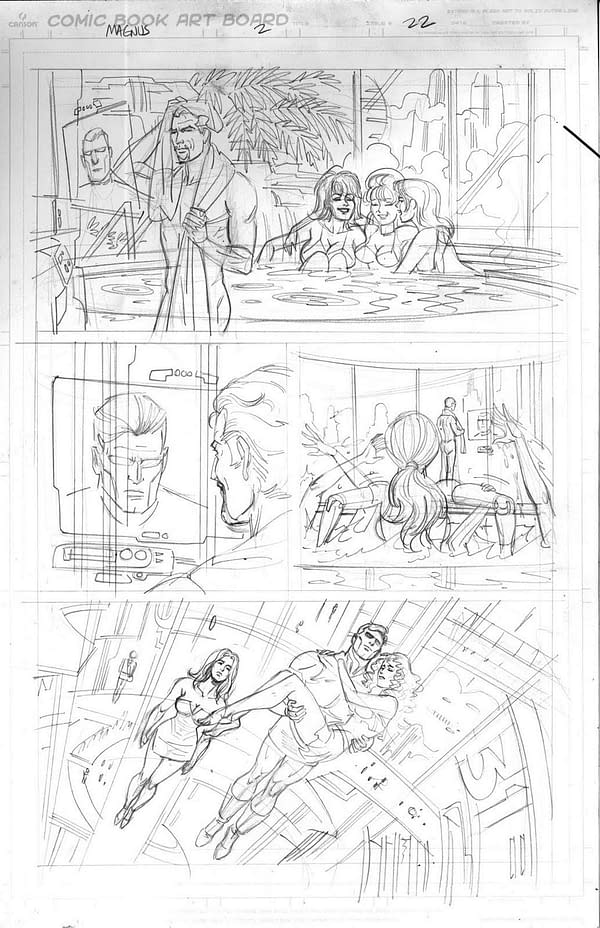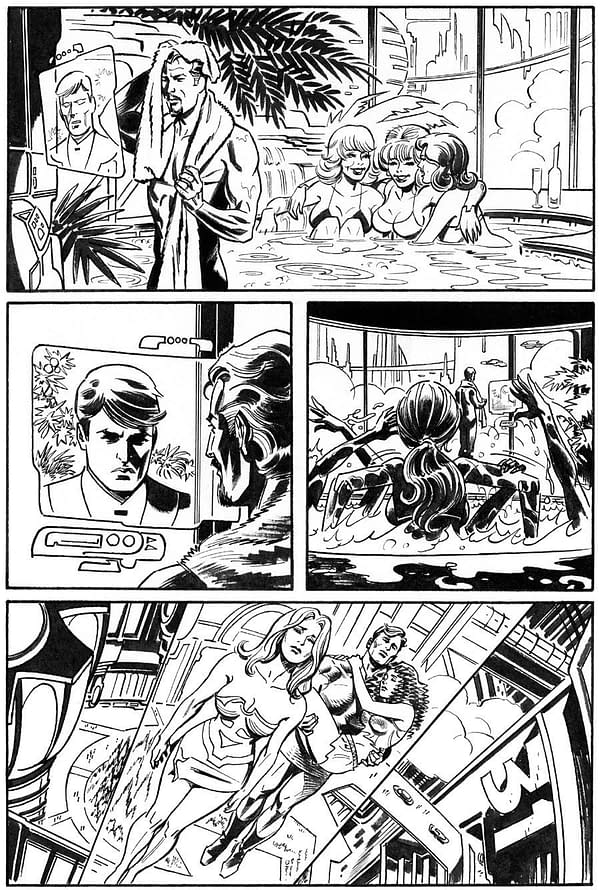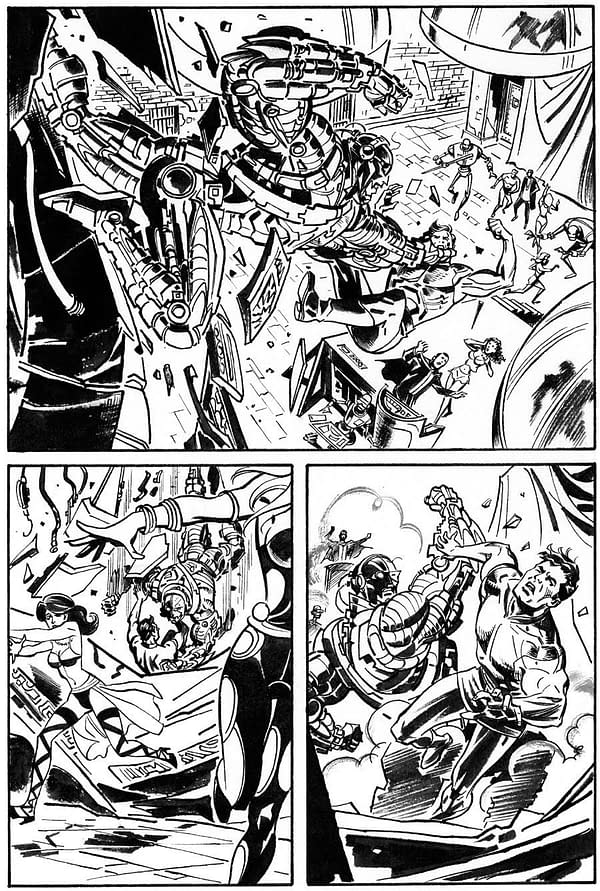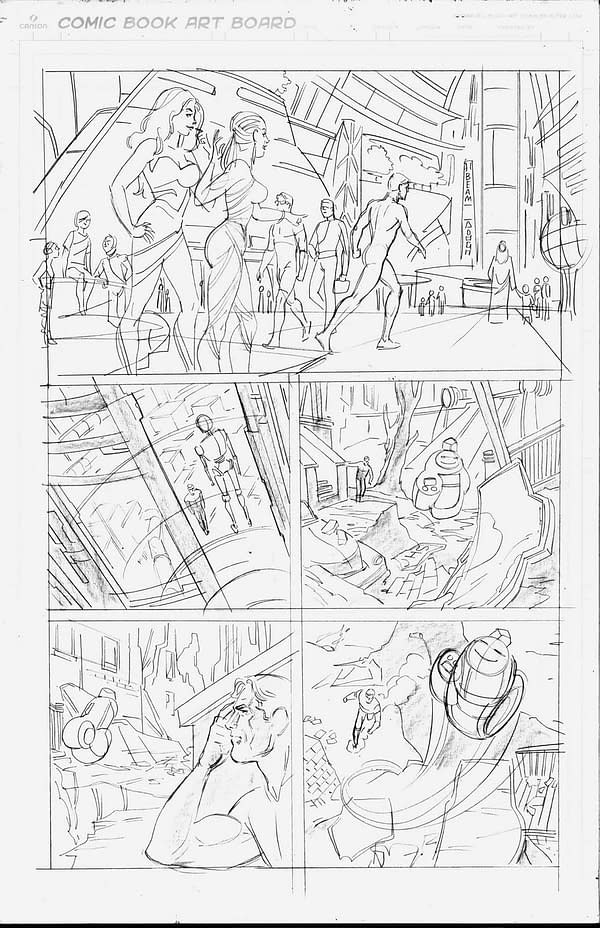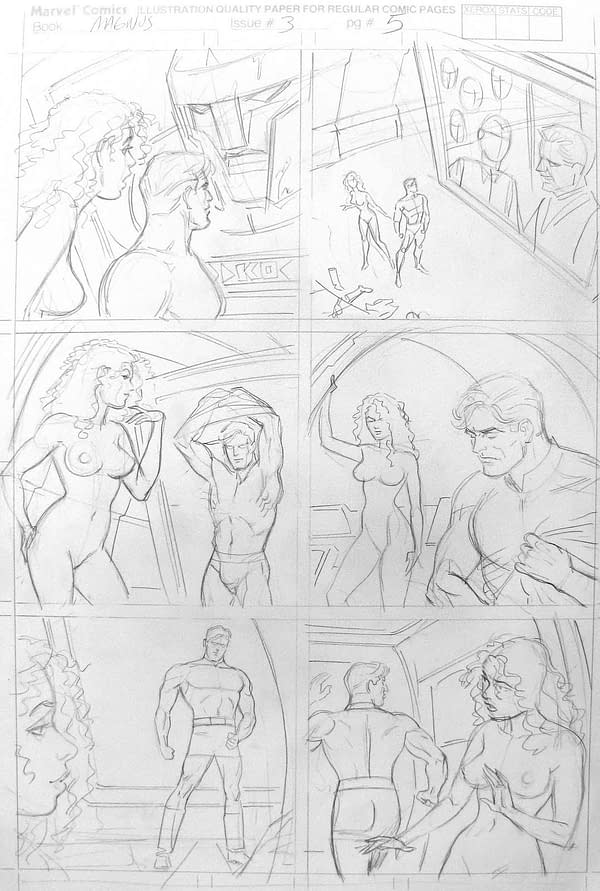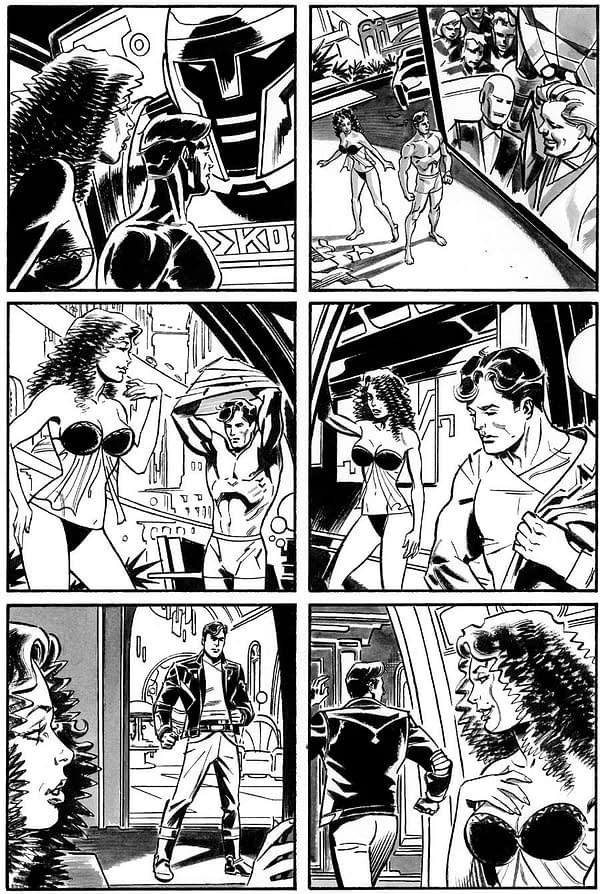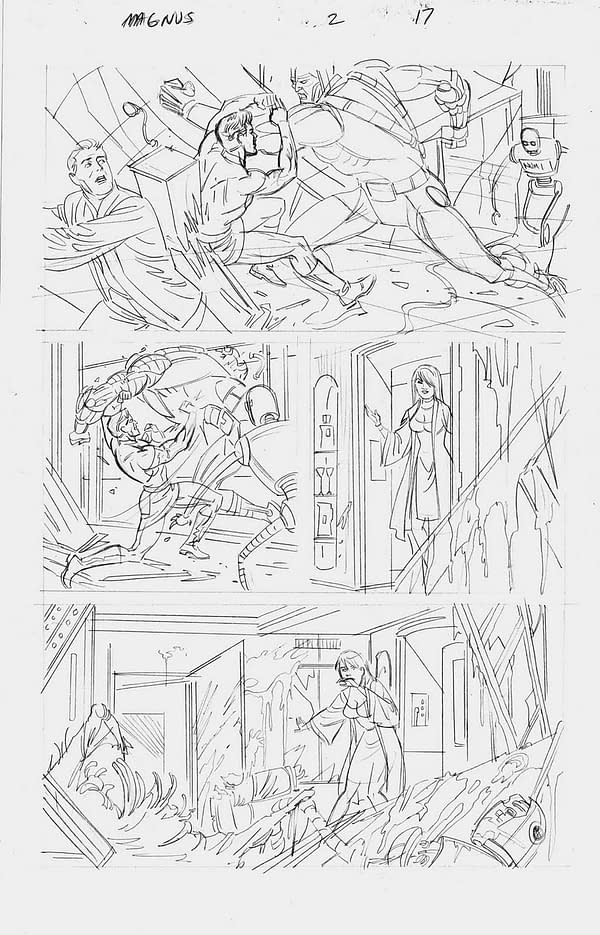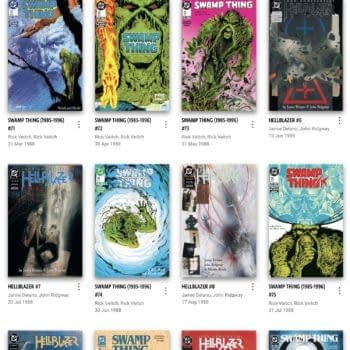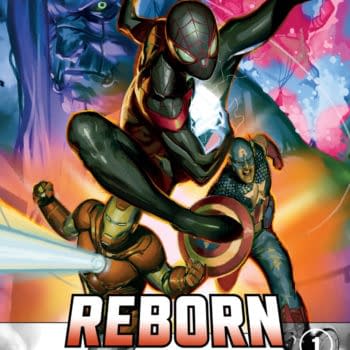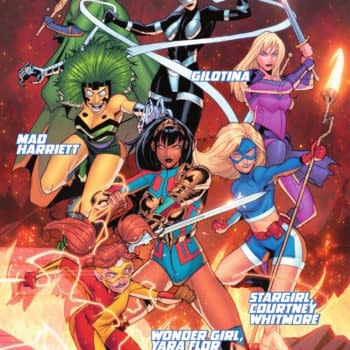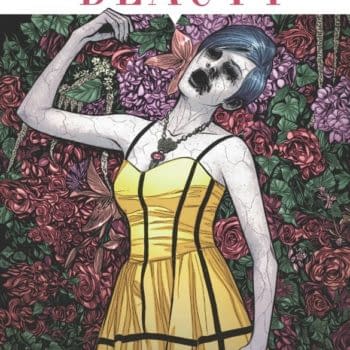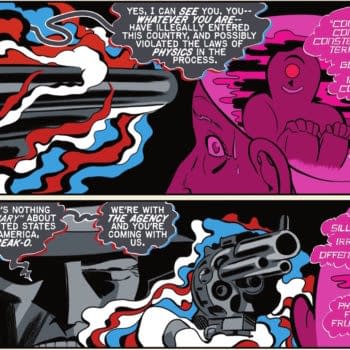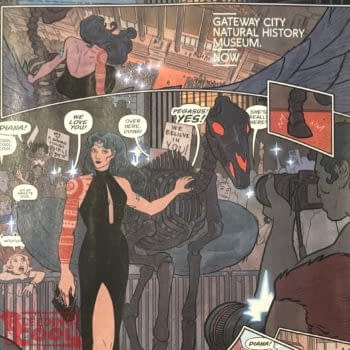Posted in: Comics, Comics Publishers, Current News, Marvel Comics, Valiant | Tagged: Jim Shooter, rip
Reaction To The Death Of Jim Shooter, The Man Who Made Comics Grow Up
The comic book industy reacts to the death of Jim Shooter,at the age of 73, the man who made comics grow up
Article Summary
- Industry legends react to Jim Shooter's passing, honoring his legacy as Marvel's transformative Editor-in-Chief.
- Shooter credited for launching Marvel's Bronze Age, pioneering royalties, and championing creator rights.
- Personal stories from writers and artists reveal Shooter's mentorship, high standards, and industry impact.
- Jim Shooter's influence shaped iconic comics, helped create Transformers lore, and inspired generations.
Yesterday, the comic book industry learned about the passing of Jim Shooter at the age of 73. Here are some of the reactions from those who knew the man, comic book writers, artists, editors, publishers, retailers and more on social media, on the man who made the comic book industry grow up.
Mark Waid: "I've just received word that Jim Shooter passed away of oesophagal cancer, which he's been battling for some time. I realize that for many he's been a controversial figure in the past (game knows game), mostly with regards to his managereal style, but my experiences with him lay outside that realm and began with my lifelong love for his writing beginning with the first time I ever picked up a copy of Adventure Comics in 1967. For those who don't know, Jim broke into comics at the age of 13. Let me say that again: 13. I don't know about you, but when I was 13, I could barely put sentences together on paper. During a hospital stay, he'd been given some Marvel and DC comics and could clearly see how much more exciting the Marvel books were and couldn't understand why DC's books couldn't have that same vitality. Having no idea how comics scripts were done, he literally wrote and drew a Legion of Super-Heroes story on notebook paper and sent it in to editor Mort Weisinger, who put him to work immediately–having no idea how young he was until later. Jim left comics in the late 1960s, returning in the mid-1970s to a DC that didn't quite know what to do with him before moving to Marvel and eventually serving as their EIC for many years. Subsequently, he launched a succession of long- and short-lived comics companies. Over the past few years, he'd been making frequent comic convention appearances. My meals and conversations with Jim were always genial, and I never failed to remind him just how inspirational his work was to me; there are storytelling choices and stylistic influences I got from him in nearly all my work. I regret that I didn't get a chance to say goodbye, but I'm glad he's finally at peace after years of suffering. Godspeed, Jim.
Paul Levitz: "This is a hard one to write, and he'd have done it better if allowed by fate to write his own obit. Jim Shooter has apparently passed after a battle with cancer. Jim was a complex man, and our relationship was just one of the minor complexities. As an adolescent, he decided to learn to write comics and draw them, and tactically studied what he thought were the best written comics of the mid-1960s (Marvels, as written mostly by Stan), and targeted his pitch to what he thought was one of the most old-fashioned/weakest comics (DC's Legion of Super-heroes). Ridiculously, impossibly, the first story he submitted was bought by editor Mort Weisinger, not an editor particularly focused on new talent. And even more incredibly, it was one of the best-written comics on the stands that month. And he was 13 when he started this project, 14 when it was published.
I was 9 when I read about that in the Legion's letters page, and sitting on my porch in Brooklyn, for the first time thought that I might do something writing comics…after all, 14 wasn't THAT far away. (For the record, I didn't sell a comics story until I was 17, and that was with the geographic advantage of being a New York kid, not working from Pittsburgh. And if I eventually measured up, it wasn't until my 20s.)
Jim's writing progressed, and his Legion was often the best-written comic in the DC line, if not mainstream comics. He stopped trying to sketch out his stories, and that sometimes improved the art and sometimes didn't, depending on who he was teamed with. But like a number of the best writers of my generation, his art skills made him a far better comics writer.
We played poker for years, rose to very different but significant positions in comics. We competed sometimes (didn't think he could get Marvel's management to follow our lead and start royalties since it would be much more expensive for them, but he did–and while I regretted DC not getting the advantage for a while, I was glad for our field that he did). We watched each other, learned from each other (I learned a lot that led me never to take an editor-in-chief role from the damage it did to Jim and his approach did to Marvel), occasionally conspired (the rescue of Jack Abel in a time of need), each championed the comic shop market within our companies in very different ways, and our paths crossed and paralelled in strange ways (we each had three distinct runs on Legion). I like to think our respect for each other continued throughout. And many of my best works as a writer were firmly based on characters he created or defined.
Jim was an excellent superhero writer, a character creator, an editor with an eagle eye, and a man who gave his all to what he did. From my perspective, he was far weaker as an enterprise leader, and unfortunately, that was what he most wanted to be. His sense of history was not, in my view, as good as his sense of fiction. But what he did well, he did gloriously…and my inner child will always be grateful for his inspiration. I'm glad we had lunch about a year ago, and shared a stage talking about the direct market at NY Comic Con not long past. And I hope he's sitting down at a poker table on a cloud with so many of our card-comrades past, dealing out the deck to Denny, Marty, Roger, Jack, Len and the rest. My condolences to Ben, and to everyone else who loved Jim or counted themselves a friend or collaborator with him. And thanks, Jim, for the stories."CB Cebulski: "Jim Shooter was many things to many people, but I don't think it's hyperbole to say that the modern comic book industry would not be the same without his contributions as a writer, editor, and editor in chief, at both Marvel and Valiant. He left an indelible mark on our business, both creatively and culturally, and I am where I am today in many ways thanks to how he brought Marvel to prominence in the '80s. I met Jim for the first time when I was 13 years old, and last saw him in the summer of 2022, when someone snapped this pic of "the two Marvel EiCs". We only spoke briefly that day, but I'm glad I got to tell him how much his work meant to me, and how it was an honor to be following in his footsteps. Rest in Peace, Jim."
Nick Barrucci: "Jim Shooter passed away. You may have liked him as a person, you may not have. He had a very strong personality. I had good interactions with him. I liked him. Regardless of how you feel, Jim was a champion of the industry, and we wouldn't be where we are at today without Jim. He was a great man. He had vision. He strengthened the industry. Good speed, Jim. You told some great stories, and your legacy is one that very few could ever hope for. Thank you for having blessed our industry."
Rob Liefeld: "Jim Shooter has passed away at 73. Jim is the greatest EIC that Marvel had post Stan Lee. Unlocked the greatness of Marvel's Bronze Era. Activated Frank Miller, Walt Simonson, John Byrne, Bill Sienkiewicz, and so many others. Took a toy tie-in and made it a blockbuster with Secret Wars! So many achievements. Gratitude for everything…
- Mile High Comics
"This ad with both our goofy photos is a relic of the time I met and dined with the most consequential & impactful Marvel Editor In Chief since Stan Lee. Jim Shooter guided Marvel during my formative years as a young fan. I encountered him as a writer first and then as the EIC for Marvel from 1978 thru 1987. I was hired at Marvel a month before he left his post. He broke in at 14 years old writing Superboy for DC Comics through the mail. He was the original comic book wunderkind. For folks my age, his Avengers tenure created the most celebrated and acclaimed run the comic had ever experienced. As EIC he unlocked talent and created Marvel's glorious Bronze Age. Frank Miller, Walt Simonson, John Byrne and Bill Sienkiewicz are just a few of the incredible talents that Shooter empowered, their signature works were crafted during his tenure, creating lasting legacies that hooked a generation on Marvel. He took a random toy tie-in comic and made it Marvel's top selling blockbuster, Secret Wars. The most important thing he did for all creators was initiate Marvel's royalty program that expanded what we could earn as cartoonists, far beyond our page rates. We were given a percentage of our sales. Every artist or writer that received royalties from Marvel owes him a debt of gratitude. The nation's top retailer, Chuck Rozanski, brought us together for the grand opening of his Mile High Comics So Cal megastore. Myself and @couchdoodles met with Jim for an extended brunch that weekend and I shared with him my gratitude and awe, he shared great stories with us. Jim was a literal giant among men; he was a visionary leader for Marvel. I am sad that I won't visit with him again. Gratitude for all you did for our art."
Chuck Rozanski: "I just received word this evening that my dear friend of the past 45 years, Jim Shooter (who is best known for his epic eight-year tenure as the Editor-In-Chief of Marvel Comics), passed away today. I am saddened beyond the power of any words to possibly convey. Our world is a far lesser place without Jim Shooter. Love is love "
Jim Lee: "RIP Jim Shooter. A towering figure in comics-literally and creatively-who helped shape the modern Marvel Universe. As Editor-in-Chief in the late '70s and '80s, he raised storytelling standards, instituted fill in issues to keep the books out on time, and oversaw iconic runs like Claremont & Byrne's X-Men, Simonson's Thor, Miller's Daredevil, and events like Secret Wars (my understanding was that he was, in fact, the Beyonder). A pretty damn magical time if you were a fan like me.
Later, after I broke into comics in 1987-l'll never forget the first time I was brought into the Marvel offices. Jim gave me a 15-minute crash course in storytelling (which he apparently did for all new pros getting hired at the House of Ideas); it was as informative as it was succinct-absolutely masterful. And long, long before that, I grew up reading that he had sold a Legion of Super-Heroes script to DC at just 13 years old. That one fact gave me eternal (and probably overly optimistic) hope. Thank you, Jim, for that bit of kindling and of a lifetime of memories "Walt Simonson: "As everybody knows by now, Jim Shooter, former editor-in-chief of Marvel back from the late 70s into the middle-80s, has caught the last train out. He was a lot more than the EIC there, of course, but his bio is all over the web already. He was complex, as has also been said already, and there are a million stories. I'll leave it for historians to sum up, but Weezie and I always found a core within Jim that we liked. So I'll add two short comments as footnotes to his history. The first is this:
In June, 1980, Weezie and I were about to get married. I headed down to Maryland a day ahead of the wedding, where my folks lived, to take care of last-minute arrangements for the ceremony. Weezie stayed behind in the Marvel offices working on the adaptation of the movie, Xanadu, that HAD to get to the printer ASAP! I made her promise to catch the train, and then pulled Jim aside and told him to be sure she got out of the offices in time to get to Maryland. He agreed. When the time came, the book hadn't gone to the printer yet, Weezie was still working furiously on it, and Jim went into her office to tell her to hit the road. Weezie, without breaking stride, barked at him to get out of her office because she still had work to do and she wasn't leaving till it was done! Jim was 6'7" or whatever, but he wisely beat a hasty retreat. Fortunately, the book went out in time, and Weezie made it to the church just as the wedding rehearsal was getting started. Literally. And Jim gave us a really nice flashlight as a wedding gift so we could find our way in the dark. We still have it. Still works.
The other footnote is mine. When old Marvel was at 387 Park Ave. S., Jim's office was adjacent to Anne Nocenti's. Baseboard heating ran through Jim's office into Anne's. Consequently, some of the conversations in Jim's office could be heard in Anne's. I don't remember who told me, but it was reported that once my name came up, Jim was overheard to say, "Simonson. Another big gun who can't be aimed." I loved it. I'll be using that as my epitaph. LOL. We're saddened by your departure but glad you're free from pain, Jim. Godspeed."
- Fred Hembeck
Fred Hembeck: "I owe an awful lot to Jim Shooter. When things weren't working out with his first choice to write the Fantastic Four Roast, he called and asked me to helm the book. Since that worked out nicely, we wound up doing a second project, Fred Hembeck Destroys the Marvel Universe. The real bad guy in that book was supposed to be Jim himself, but he pointed out that the Marvel bigwigs wouldn't take kindly to seeing his name in the title, so he suggested I instead take the credit–and the logo. Well, I didn't fight him very hard, and here I am, decades later, one of very few cartoonists with their actual name part of an actual Marvel Comic. Jim did that. And when he edited the Roast, he changed the dialog in one panel depicting Nova simply because changes to the character had been made that I was unaware of while working on it. That was it. As for the FH Destroys the MU, well, my favorite part of what was originally a 48 page book was a lengthy framing sequence starring Jim (as Marvel's Editor-In-Chief) and his three assistants, Bruce, Clark, and Diana. However, the book was delayed just long enough (my fault) to miss out on being published before Marvel let him go. It eventually came out in a truncated 32 page version with nary a cartoon Shooter in sight, which was a shame. Those pages–fully completed–are posted on my inert but still existent web-site. During the early eighties, I ran into Jim often as mutual guests at various comic-cons, but after leaving Marvel, I believe I only ever saw him once at a show. He was always friendly, and the two times we worked together, he couldn't have been nicer. I'm very sorry to learn of his passing. Thanks, Jim–you made me a star!"
Lynn E. Cohen Koehler: "I'm devastated to share that Jim Shooter has passed
He was my "Boss" and mentor for almost 5 years at Marvel Comics. He had my back and I had his. He taught me so much about design and editing. I use those skills every day and always appreciate what he shared I'm empty. I always knew I could count on him. And now he's gone. Rest in peace Jim"Simon Furman: "Saddened to hear of the passing of ex-Marvel E-I-C Jim Shooter, a towering presence in the comic book industry in general and someone who made a big impact on me when he visited the Marvel UK offices back in 1985(?). I met Jim a few times after this and was quick to tell him how much his feedback and advice on what we were doing (on #transformers and other titles) had sunk in, and shaped my work thereafter. He may have been blunt but he knew comic books. RIP Jim."
Kelley Jones: "Jim Shooter has died. When I got hired to draw comics for Marvel Comics many years ago Jim Shooter flew out to do several signings in my area and asked if I'd come and meet him, which I did with great trepidation because he was the boss of bosses and I was just starting out. When he finished a signing, he asked if I'd like to go out for a meal anywhere I wanted, and we could talk about making comic art professionally. I told him, let's go to McDonald's. We talked for hours and a lot about Jack Kirby. When it was over he asked why did I want to eat at McDonalds of all places. I told him very earnestly that I didn't want Marvel to pay for an expensive meal as I was a nobody. He laughed his ass off and hugged me saying I was Marvel material!! He was always very kind to me all the years after. God bless him."
Greg Capullo: "RIP Jim Shooter. Jim graciously reviewed my portfolio as a young kid. I never had an appointment. I'd just drive down to the city, head to their offices, ride the elevator up and hope for the best. Something that'd be impossible to do post 9/11. Thank you, Big Shooter"
Erik Larsen: "Well, sh-t–we just lost another one. Jim Shooter just passed away. He was 73.
Jim was the editor-in-chief at Marvel when I was an aspiring artist. I sent him samples, which he politely rejected again and again. Eventually, I got in somewhere and started figuring stuff out. Jim gave me my first Marvel gig–a fill-in on the Mighty Thor. The two of us hammered out a plot in the hotel bar during a Chicago Comic Con. He had his favorite writer script the story and his favorite inker ink the story and that's how I ended up subbing for Jack Kirby in that classic creative team. It would be the last issue Stan Lee and Vinnie Colletta ever worked on.
Jim was much loved and much loathed. He had very specific ideas of how things should be done and drove creators away from the company at times. He had his list of rules and woe be it to anybody who crossed him. But his reign didn't last forever and eventually Marvel kicked him to the curb.
Jim licked his wounds and went on to form rival Valiant Comics, until, again, he was shown the door.
After that it was the short-lived Defiant Comics.
I'm sure many people will go on and talk about his many virtues and talents. I just worked with him the one time so I don't have many stories to tell. I just have the one book where I subbed for Jack in that classic Thor creative team and had my name misspelled."Kevin VanHook: A few quick thoughts on Jim shooter before I call it a night.
Jim and I met a few times in the 1980s before I eventually joined him at Valiant comics in 1992. On that first day in New York, at the Valiant offices, Jim offered me a few thousand dollars more a year than what I had asked for. And the company agreed to pay for movers for my family's furniture and belongings. I still needed money to get into an apartment and Jim lent me that money with me promising to pay him back when I got my tax refund a month and a half later.
I did.
He encouraged me to take a pass at writing the first couple of issues of the Eternal Warrior scripts. He had already plotted the stories and they were drawn. While he didn't use any of my dialogue for those first two issues he liked what he saw and encouraged me to keep going. I was already a professional writer artist at this point, but had never really had a big consistent career with larger publishers. When Jim was let go from the company, I was asked if I could finish the two current books that he had started since I was already beginning to work on them on my own. That night, I called Jim and told him that I was sorry that things had worked out the way they had and that I had been asked if I would write these comics, but I didn't want him to feel as if I was somehow taking unfair advantage of the situation. He told me that he had planned for me to start writing solo soon anyway and I was a talented and smart guy and he left the call with, "go with God. "
I did.
That's why you'll see that starting with Issue 4, it's plotted by Jim and scripted by me. He actually only got to plot like the first 8 pages before he left and I took over from there.
Lunch.
The day I was hired, Jim asked his assistant Debbie to order lunch from a local place called the Oakwood Café. You gotta realize that I was raised by a couple of Kentuckians who didn't go to restaurants a whole lot. We ate at home. So, they decided to have sandwiches and I was used to only having bologna sandwiches although I think I might've had a roast beef sandwich at some point at that time and maybe a ham sandwich. So, I asked for a roast beef sandwich and then Debbie asked me what kind of bread I wanted it on.
I said, "Just…bread…" Confused.
Jim must've seen the look in my eyes that resembled those of the notorious deer caught in headlights. He chimed in, Kevin grew up like I did. You mean white bread right, Kevin? Get it on a roll. (Turning to me) you'll like it…"
I did.Ted Sikora: "I am forever grateful for the stories that came out during Jim Shooter's time as a writer and/or Editor in Chief at Marvel Comics throughout the 70s and 80s — from Moench/Sienkiewicz's Moon Knight to Miller's Daredevil to Claremont/Byrne's X-Men to his own Secret Wars. That was a great time to be going through formative years.
in 2017 I was fortunate to be next to him at a convention where, near the conclusion, I worked up the nerve to hand him our Tap Dance Killer series asking for feedback. He said, "I will read it, but I have to warn you, I'm going to be honest." A couple months later he sent a glowing note which included a pull quote for the book.
The next time I saw him was at Big Apple Con a couple of years later. He said he wanted to get together and share some comic biz insights with me. I was anxious to take him up on this, but his schedule proved pretty tough to crack.
In October of last year, when it was reported that he was going through cancer treatments, I sent him a note of gratitude and wished him well. He replied, "We should work out a time to talk. I have a very busy schedule of naps, treatments, naps, telemeds, naps, and naps. : ) What's a good time for you to have a phone chat? I think I can stay awake for that." Somehow, during those painful treatments, he found the time to have that session with me. During the call, I was blown away by his level of thinking. The talk led to further correspondence where he shared even more comprehensive thoughts and examples on what makes for a great story, layouts, panels, color theory, and inking. His talent level as a writer and editor speaks for itself, but Jim Shooter's generosity can not be overstated. Thank you, Mr. Shooter, for the stories, for the lessons, for the kindness. I'll do my best to make you proud."Billy Tucci: "I have been so blessed in my comics career to have had many shared long nights in deep conversation with some of the greatest who ever put pen to paper and made us believe in heroes. A few blessed me even more to call "friend." Today, we lost on of our heroes, Jim Shooter. As my friend Rob Liefeld stated, "Jim is the greatest EIC that Marvel had post Stan Lee. Unlocked the greatness of Marvel's Bronze Era. Activated Frank Miller, Walt Simonson, John Byrne, Bill Sienkiewicz and so many others. Took a toy tie-in and made it a blockbuster with Secret Wars! So many achievements. Gratitude for everything." Gratitude indeed for a literal "giant of the industry", whose whole life was comics and we are forever the better for his passion. Goodbye Mr. Shooter. Thank you, and Godspeed on your eternal journey amongst the stars."
- Bill Vallely notes
- Bill Vallely notes
- Bill Vallely notes
Bill Vallely: "My favorite memory of Jim Shooter is when he took me out to dinner, and told me how to write comic books. Here are the notes I took that day."
Mike Collins: "Remember this meeting with Jim where all the Marvel UK freelancers were summoned to the office and he told us that if we were carrying the Marvel name on the comics, we had to do all the Marvel rules. It was a bit of a revelation for us all, in our freewheeling goofy British comics approach – no shattered panel borders! No slanted frames! Avoid Dutch angles! He was physically intimidating, but he had his rules, and we took on board his comments. As it happens, as my style has always been fairly traditional, I probably had the least to change, but it was a revelation to us that there was "the" way to do things. This was the only time I met him, tho I had loved his Legion of Super Heroes comics, so I respected his experience and opinions. May his memory be a blessing."
Fabian Nicieza: "I wish nothing but peace for a man who rarely seemed at peace. He was instrumental in my career and I thank him for that. Though he was complicated, I believe Marvel, the direct market, and possibly the industry itself, might not exist today without what Jim Shooter did as EiC."
Martha Thomases: "Jim cancelled DAKOTA NORTH while I was sitting in the Marvel offices with my toddler son on my lap. That was rough. But he was always sweet to me when I saw him after that. At one point, I had a complete set of his business cards. Sorry to hear that his last years were tough. He was the kind of person one could only meet in comics."
David Hillman: "He was my editor and chief at Defiant Comics. An incredibly good man, a great teacher, I really enjoyed working with him. He taught me how to use my powers for good."
Scott Kolins: "Jim Shooter and Bob Layton hired me for my first comics job – at Valiant. The working partnership didnt last long – but both sent me on my way with helpful phone calls that got me, my next jobs. I'll never forget."
Cliff Biggers: "Jim Shooter has died. I am shocked and saddened by the news. Jim was "one of us"–a fan who had such talent that as a young teenager, he began selling scripts to Mort Weisinger at DC (who did NOT know that Jim was a teenager and could not legally sign contracts). Jim wrote some of my favorite Legion of Super-Heroes stories during his time at DC. Later, Jim became editor-in-chief at Marvel, where he got the company back on track and led Marvel to produce some of its finest work since the early Lee-Kirby-Ditko days. After he was replaced at Marvel, he went on to make Valiant a publishing juggernaut during the 90s. Jim was a brilliant editor, an insightful scholar of comics, and a fascinating conversationalist. I remember his good humor at the Shooter Roast, where he gave as good as he got. But most of all, I remember him as a man who never quit being a fan of good comics. Less than two years older than me, Jim never seemed to forget his fan roots, and always greeted me with a smile and a warm hello whenever we would meet at conventions, and his emails were a delight. I had always assumed that our paths would cross again. The entire art form benefited from Jim's contributions."
Ty Templeton: "Some years ago, I was at a convention with a bunch of guests and the group decided to eat at a restaurant downtown, and the decision was made to dine at a Hooters. I didn't want to be THAT guy and leave, but I also didn't want to order food or contribute to the premise of the rather offensive chain, so when we filed inside, I claimed I simply wasn't hungry and ordered water. Jim Shooter asked why I wasn't eating and I told him quietly that I had a young daughter, and on principle didn't want to eat there, and he agreed. The two of us sat at our end of the table sipping water and not making a fuss or a comment about it to the rest of the table and no one but Jim and I knew why we weren't eating. I always thought that was classy. F-ck Cancer."
Dennis L Barger Jr: "Damn!!! Jim Shooter was my editor in chief, every book I read off the rack for the first many years was his baby, then I got to meet him at a con and bought him a drink just to show him my gratitude, little did I know it would lead to 30 minute history and dish session – AMAZING!!! Great running into him for the next few decades…. Remember the candle that burns twice as tall still burns pretty damn brite for 50-60 years… you might not have liked him, but he dedicated almost and entire lifetime to comics… RIP Jim Shooter, enjoy the short trip to heaven cause you were already half way there tall boy"
Scott Williams: "Shooter, along with editor Carl Potts, hired me at Marvel in 1985. He was exceedingly generous to me with his time and helpful encouragement. Ran Marvel with an eye towards talent and always trying to make Marvel greater. Nothing but praise for the man. RIP Jim Shooter.
Mike Baron: "Jim Shooter was a legend."
Cully Hamner: "I'm hearing from numerous sources that Jim Shooter has passed away. I can't say that I knew him, really. I never worked for him at Marvel or Valiant, and I only met or spoke to him a handful of times at conventions. He was always nice. But his era as EiC at Marvel was MY Marvel as a reader. Not that I haven't read and very much enjoyed and followed other eras at Marvel, but his was the one that formed me as a reader and a creator. His era was the one that had almost all of my favorite creators doing their career-defining work, all while he also was doing his own best stuff as a writer. So thank you, Mr. Shooter. The mark you made is deep. Rest in peace, sir."
- Mike Manley
- Mike Manley
- Mike Manley
- Mike Manley
- Mike Manley
- Mike Manley
- Mike Manley
- Mike Manley
- Mike Manley
- Mike Manley
- Mike Manley
- Mike Manley
- Mike Manley
- Mike Manley
Mike Manley: "Sorry to read this evening that Jim Shooter has passed away. I knew another person that died for that type of cancer and that had to be really brutal. I crossed paths early in my career with Jim, getting a critique from him at a con with him using his well-worn copy of that Human Torch comic featuring the Acrobat or somebody as Captain America. And Jim was a guy who you heard all kinds of stories about. Many people really didn't like him, but I know many people who did very close personal friends of mine who he was very kind and gracious too early on in their careers. He was always very nice to me and very complimentary about my work, except for one occasion, which I will get to in just a bit. I think the thing with a guy like Jim and many people who are top dogs is they get that way and in that position by having very strong opinions and being able to get people to basically go along with what they say. Jim obviously was one of those people, and there were many like that in Comix back in the old days, and I think Jim was pretty conservative, at least as far as the mechanics of how to do comic books.
And essentially he was not wrong, but one of the things that you learn is that, yes, there are rules or formal issues of how to tell a story, there are the core rules, and then there is your opinion or your taste. Something can go against your taste and still be right. I think from everything that I have heard or learned or experienced with Jim, that's the sticky part, what the big disagreement was with many people, including me.
The first time I worked with or for Jim was on an issue of XO Man of War right in the beginning days of Valiant, which came about because Jim actually called me on the phone and was trying to get me to go and become one of his regular stable of artists. I was very flattered by that, but by that time, I was also a bit cautious for a few reasons. One I heard of his reputation and him being kind of a stickler for a certain approach to storytelling which I pretty much did, which is one of the reasons why I think my work appeal to him, but also his company was new and I had many friends who got burned by companies like Now and First being owed thousands of dollars. I was also doing quite well working for Marvel. So I thought, well, I don't know if I would wanna fly my flag under Valiant, but maybe I would be happy to do work for him. I did that one issue of XO and some inking. Ironically, I ended up after Jim was gone working for Acclaim— but I quickly jumped the ship as I could see it was starting to list heavily to one side.
Decades later, I came to work with Jim on Magnus Robot Fighter for Dark Horse. It's ironic because many, many years back in the 80s, when I was doing a lot of activity books for Western publishing, I inquired through my editor about Magnus and some of those old properties from Gold Key. My editor put me in touch with a guy named Ray Butman, I believe.
I even met him at Toy Fair, and he told me that someone was already interested in those properties, and that guy turned out to be Jim Shooter. I believe I even did a sample painting to send to Jim, sort of doing an updated version of the costume, along with his girlfriend, and painted it in a sort of mock old gold key cover style. I don't remember now if I sent that to him or not, I may have, but my memory gets kind of foggy here.
Anyway, skip to about 10-15 years ago I finally did get to work on Magnus, and as it turned out, shooter was writing the book. To help with deadlines for Bill Reinhold, who was doing the book at the time I came on to do layouts, which I am showing some of here and then Bill was doing finishes. I got the script from Jim, which also included photographs of the shoes that Jim wanted the girls to be wearing in the comics. Now I've gotten all kinds of scripts and all kinds of reference, but I've never gotten a script that had reference for the kind of shoes that a woman had to be wearing. Funny, but there were no notes about what Magnus had to be wearing.
Everything seem to be going pretty straightforward and as you can see, the pages are pretty much in the grid that shooter really liked. But there were a few things where I was doing inset panels or a page with all horizontal panels and started getting negative feedback from Jim. I no longer have those emails because that computer crashed and died. I might somewhere still have that script .
Anyway, since I was just doing layouts, I kind of said, well, it looks like I must be doing something wrong. I can't second-guess and work effectively, I don't wanna cause you guys any more problems, so I'll get off the project. Good luck. Oh, no no no no wait! We love what you're doing is what I heard from the editors and a course from Bill. But for what they were paying me for and everything. I'm not gonna start redrawing stuff or trying to guess what Jim would or would not like to see. F that noise. This was a prime example of why I did not go with Jim's offer in the beginning. Because I knew that about him, I knew that he was that type of editor and sorry, I'm not gonna work that way. Especially at that point in my career. So I think the solution ended up being they stopped sending the stuff to Jim until after it was already done.
I get the idea and knew what he was talking about, or liked, but I do not think there's only one way to do a comic book. The language of comics did not stop in 1965. Sometimes a story point is better served than a grid. The language of comics is still growing today. I really enjoyed working on Magnus because I love that character as a kid, so that part was fun and working and seeing what I did so brilliantly finished off by Bill Reinhold is a jewel in my career. No hard feelings against Jim and his opinion, I just simply didn't agree with it and didn't want to create a problem for the team who was already up against the deadline. Again, sometimes people have very strong opinions about. How things should be done. I'm one of them. I have very strong opinions about what I think makes a good comic or what makes a good layout or clarity, storytelling, drawing, etc., but I think I have a much wider taste and appreciation to various approaches than Jim probably did. And you know that's fine. That's what makes the world go around. So Godspeed, Mr. Shooter."Scott Rienbeck: Jim Shooter's importance to Transformers in the 1980s was highly significant, arguably foundational, for the franchise as we know it. He wrote the original Transformers pitch document: As Editor-in-Chief of Marvel Comics, Hasbro approached Marvel to develop a backstory for their new transforming robot toy line. It was Jim Shooter who personally wrote the initial pitch document, outlining the core premise of alien Autobots and Decepticons coming to Earth to fight for resources. This established the fundamental narrative that would launch the entire franchise. He established the core concept of Cybertron and the war: Shooter's vision for the Transformers was that they were two warring factions of alien robots from a metallic planet called Cybertron, who brought their conflict to Earth. This central conflict and origin point became the backbone of all future Transformers media. He oversaw the creation of key character profiles: While Dennis O'Neil initially worked on character profiles (and famously coined "Optimus Prime"), Shooter was ultimately unsatisfied and assigned the task to Bob Budiansky. Budiansky, under Shooter's direction, created the names and personalities for many of the beloved first-wave Transformers characters, including Bumblebee, Starscream, and Megatron. These profiles were used not only in the Marvel comic but also on toy packaging and passed along to the cartoon writers. Marvel's comics provided the initial lore: The Marvel Comics series, which Shooter oversaw, was crucial in establishing the early continuity and expanding upon the concepts he laid out. While the cartoon eventually became more prominent in the minds of many fans, the comic book served as the original source of the lore that Hasbro used to launch the toy line. In essence, Jim Shooter, through his role at Marvel Comics, provided the crucial narrative framework and initial character development that allowed the Transformers franchise to become the multi-million dollar property it is today. Without his direct involvement in creating the initial pitch and overseeing the early creative development, the Transformers might have had a very different origin story, or perhaps not even achieved the same level of success."




